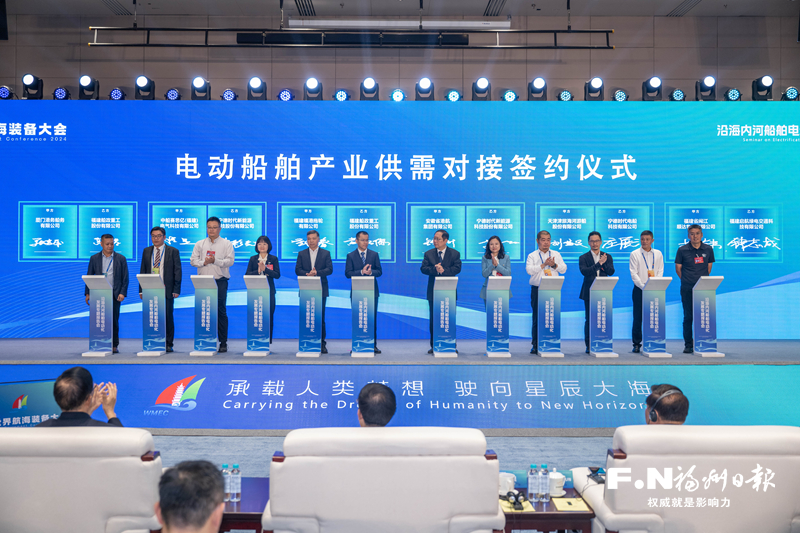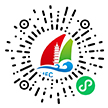The Seminar on Electrification of Inland and Coastal Ships Was Held
“Green Heart” Pulsates and Electric Ships Are Poised for Great Potential
Amid the global wave of clean energy transformation, the development of electric ships has reached a critical juncture. On November 16, the Seminar on Electrification of Inland and Coastal Ships took place at the Fuzhou Strait International Convention and Exhibition Center. Representatives from government, industry, academia, and research convened to exchange insights on hot topics such as the opportunities and challenges, technologies, and regulations surrounding the electric ship industry. The seminar aimed to strengthen communication and collaboration along the industry value chain, contributing collective wisdom to advancing the electrification of ships.
Expert Insights:
Transitioning Ships Toward Green and Smart Futures
The development of electric ships is a key direction for fostering marine new quality productive forces. According to E Fei, Chief Technology Officer of CAEV Technology Co., Ltd., compared to traditional oil-powered ships, electric ships feature zero emissions, no pollution, low energy consumption, and high comfort.
“The shipping industry serves as a critical backbone of global trade, handling over 80% of trade transportation volume. It is undergoing a transition from traditional operations to green and intelligent modes,” explained Guan Liangqing, General Manager of Fujian Province Fuchuan Marine Engineering Technology Research Institute Co., Ltd. Electric ships, as vital carriers of this green transition, have seen rapid development in recent years. Local governments across the country are introducing policies tailored to regional environmental conditions to support the electric ship industry. By the end of 2023, China’s fleet of electric ships exceeded 700 vessels, covering various types such as ferries, coastal ships, passenger vessels, and tugboats.
In the view of Pan Delu, an Academician of the Chinese Academy of Engineering, China’s small-scale green intelligent ship industry has surpassed a trillion yuan in scale. Applications of these ships in areas such as marine public service enforcement, ocean monitoring, green coastal tourism, and wireless ad hoc network technology have significant implications for the development of the tourism, satellite, marine, shipping, and IoT industries. These advancements are expected to generate enormous economic benefits.
Then what underpins the development of small green intelligent ships? “Talent, talent, and talent!” Pan Delu emphasized. He called for accelerating the establishment of integrated platforms for the development of small ships that combine government, enterprises, commerce, academia, and research, and advocated for increased investment in cutting-edge basic research on small ships and the cultivation of specialized teams dedicated to advancing small ship-related technologies.

At the seminar, a signing ceremony for the supply and demand matching of the electric ship industry was held. Reporter: Lin Shuangwei / Photography
Exploration and Practice:
Fujian Promotes Full-industrial-chain Development for Electric Ships
The nation’s first green emergency tugboat, Xiamen Harbor Tugboat 30; Fujian’s first fully electric ship, Moli; and Fujian’s first hybrid-electric inland cargo ship, Wuyi 2... In recent years, Fujian Province has leveraged its solid shipbuilding industrial foundation and advantages in new energy battery industries to pioneer the concept of electric ship development. Adhering to the development goal of “being rooted in Fujian, serving the Yangtze River, and addressing the needs of the nation”, Fujian has established a comprehensive industrial chain for electric ships. This chain encompasses upstream R&D and design, midstream assembly and construction, “three-electrical” system development, and operational support facilities, as well as downstream ship application. To date, Fujian has implemented 10 types of electric ship demonstration projects, covering a total of 80 vessels. The province leads the nation in core technology products for electric ships, with over 1,000 electric vessels in use domestically and internationally, capturing more than 40% of the domestic market share. Fujian has achieved full-scenario demonstration applications across “rivers, lakes, and seas”.
While the potential for electric ships is vast, the path to widespread adoption is not without challenges. Tang Wenjun, Deputy General Manager of Wuhan Changjiang Ship Design Institute Co., Ltd., points out key issues such as range anxiety for electric ships, poor product interoperability, and the need to enhance crew skills.
To address these challenges, Fujian is focusing on six major areas: standardizing ship models, clustering industries, integrating shore power, marketizing operations, professionalizing construction, and systematizing standards. The province aims to build specialized electric ship industrial bases, accelerate the development of a diverse electric ship supply system, and promote high-quality development across the entire industrial chain.
Guan Liangqing noted that, in recent years, Fujian’s electric ship industry has been driven by application scenarios across “rivers, lakes, and seas”, achieving mature design and construction capabilities while fostering the industrial chain. However, the sector still lacks a collaborative platform and mechanism for sharing resources. To address this gap, Fujian Shipbuilding Heavy Industry, a subsidiary in the ship business of Fujian Shipbuilding Industry Group, plans to lead the establishment of the Fujian Provincial Green Intelligent Shipbuilding Innovation Center in collaboration with key industry players such as the China Classification Society and CATL to tackle technological challenges in industrial planning, generic key technologies, industry standards, and standardized ship models for the electric ship sector.
Achievement Release:
China’s First Systematic Training Manual for Battery-powered Ship Crews Released
At the event, the new book Safe Operation and Management of Battery-powered Ships was officially launched. As the nation's first systematic training manual for battery-powered ship crews, the book covers a wide range of disciplines, including nautical technology, marine engineering, new energy technologies, and safety management. It integrates multidisciplinary knowledge and is structured based on a “theoretical teaching + practical training” approach. The book comprehensively presents the knowledge system, operational guidelines, safety management protocols, and emergency handling measures for battery-powered ships. It serves as an effective guide for crew training and ensures training quality, contributing to the sustainable and healthy development of the industry.
According to reports, the book was spearheaded by Fujian Chuanzheng Communications College, which organized a team of technical professionals from fields such as nautical technology, marine engineering, and new energy to compile the content. Additionally, experts and scholars from organizations such as the China Classification Society and Wuhan Changjiang Ship Design Institute participated in its review, ensuring that the book closely aligns with advancements in battery-powered ship technology and meets crew training needs.
During the supply-demand docking session of the electric ship industry, representatives signed agreements on projects related to electric vessels, propulsion systems, shore power facilities, corporate implementation, and strategic cooperation. These agreements aim to strengthen the integration of upstream and downstream supply chains in the electric ship industry, deepen supply chain management, enhance collaboration across industry segments, and achieve efficient resource integration within the sector. (Reporters: Yan Lanping / Text, Lin Shuangwei / Photography)







